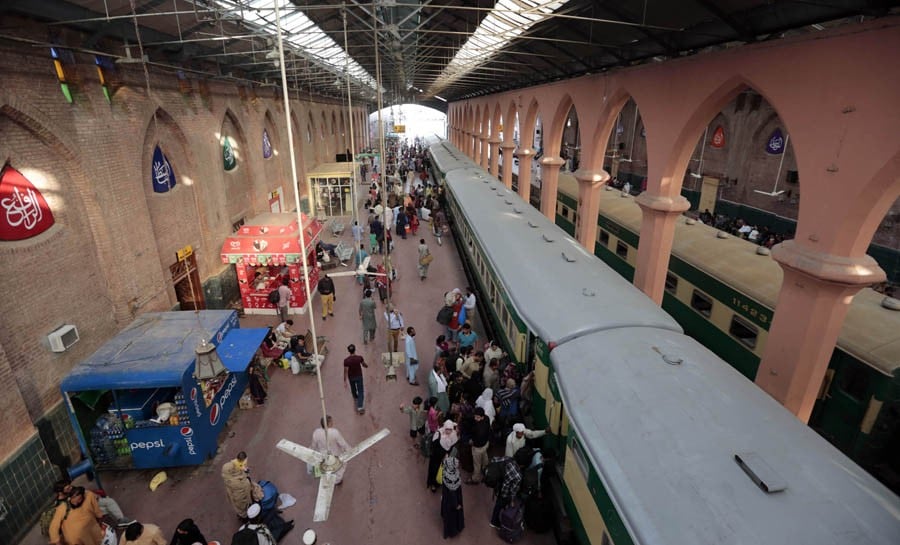
For the first time, Pakistan Railways held balloting for 11,000 vacancies, generating debate on whether this decision will eliminate bias or compromise merit

How accurate would it be to say that Pakistan Railways is heading towards a slow-motion train crash? Its recent record of train accidents has held people in disbelief. They’ve been frequent and costly. As if that were not enough, its latest announcement to fill up 11,000 positions through balloting, not merit, is catastrophe of another kind.
Earlier this month, on the direction of the Establishment Division, for the first time, the Railways held balloting for 11,000 vacancies in BS-1 to BS-5 advertised mostly in the Pakistan Railways’ (PR) Lahore, Karachi, Rawalpindi, Peshawar, Multan, Sukkur and Quetta Divisions. The positions were advertised in December 2018.
However, and rather oddly, the results of balloting were withdrawn in Rawalpindi and Lahore Divisions. "The manual balloting held on September 6, in the presence of general manager of Railways and other senior officials, got cancelled," confirms Rafiq Sajid of Pakistan Railways. "The affected applicants complained as their selection for the advertised positions was almost final. Medical test slips had already been issued to them."
Similarly, computerised balloting held in August in the Rawalpindi Division through a third party -- "Bahria University after developing a special software, like the one used for Hajj selection was cancelled," says Ali Nawaz Malik, Media Director Media to minister of railways. The reason, he explains, was that the Establishment Division notified the balloting criteria after the balloting held in Rawalpindi. "According to the notification, ballot must be held manually and under the supervision of an appointing authority one step higher than divisional superintendent (DS). So, since the Rawalpindi balloting did not meet the conditions, we had to nullify the results."
Before the Establishment Divisions intervention, the PR had completed the scrutiny process and shortlisted candidate for positions like C&W clerks, gatemen, resthouse gatemen, masons and carpenters. PR was then directed to halt the finalisation of recruitment, and follow the procedure outlined in the June 17notification whereby prime minister had approved amendments in the Civil Servants (Appointment, Promotion and Transfer) Rules 1973. It directed all BS-1 to BS-5 vacancies to be "filled through balloting".
Since then, there has been appalling confusion in the PR over the recruiting process. Starting with advertising vacancies in December, to shortlisting candidates, to change in the rules of appointment, to balloting and to ultimately cancellation of the ballot, what could have been a routine hiring process has turned into a fiasco. It has caused delays and inconsistencies.
"Mein iss decision ke haq mein nahi tha keh qurrahandaazi ho (I was not in favour of balloting)" says Sheikh Rasheed Ahmed, the federal minister for Pakistan Railways. "I objected to this change in the cabinet meeting. I saw it as a political setback."
But now, "mein iss decision ka haami hoon (I support the decision)," he adds.
Sheikh says that before the employment process was launched he had no idea how widespread unemployment was. "We have applications from FA and BA graduates for positions of gangman that requires minimal formal education. I am flabbergasted. Let’s just pick people from this vast pool of talent on the basis of balloting."
He adds, "Appointments through balloting will eliminate the possibility of political patronage. We’ve been spared the granting of favours."
Perhaps the minister means well. Also, any change of rules however major or unwelcome brings opportunities. But is this not a shortcut to the otherwise very daunting task of employing the deserving candidate for a government position?
Asadullah, who retired from PR in 2008 as AGM Traffic, thinks the new hiring method is not right. "The way to avoid political appointments is by not politicising the position. All appointments should be made on the basis of merit, through tests and interviews. Hiring the right-person-for-the-right-job is a real test for the institution. It is vital for satisfactory operation of the institution."
He concludes, "This is lottery. Here we’re not picking people to send them for Hajj".
Umair Javed, an assistant professor at LUMS and columnist, believes that hiring through balloting is a "blunt way to eliminate bias". "This method faces a trade-off -- to avoid political appointments, you forego the chance of hiring the best person for the job."
He also says this method has some structural problems, "the personal interaction with the candidate is done away with."
This is a subject in consideration. Examples of such hiring are aplenty. For instance, balloting is held in selecting labour for Gulf states and other countries. South Korea accepted as many as 15,750 applications of Pakistani candidates who are seeking employment opportunities in its manufacturing sector under Employment Permit System (EMS) agreement signed by the two countries in 2008.
Irfan Mufti, a human rights defender, says introduction of balloting to select government employees is opening a Pandora’s box. "People with less qualification may get selected for positions crucial to Railways. They may jeopardise the security of passengers and other stakeholders."
He points out that Pakistan Labour Policy (2010) states that the government must ensure facilities for proper matching of job opportunities and jobseekers must be strengthened by streamlining standard procedures. "The recent decision will violate this fundamental condition."
The battle for merit-based recruitment at the Pakistan Railways has been long and frequently hit by controversies. Too often political favourites rather than the-right-person-for-the-right-job have been granted the positions. Only time will tell how this amended recruiting method affects government institutions. For now we’re having a good laugh.